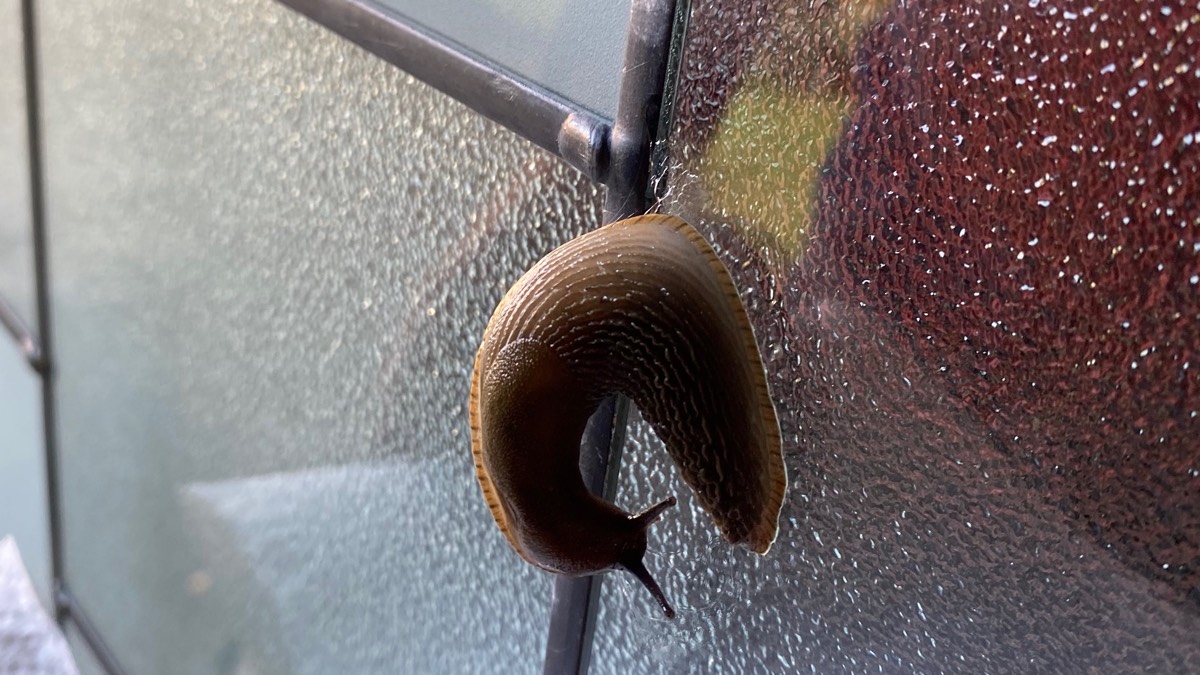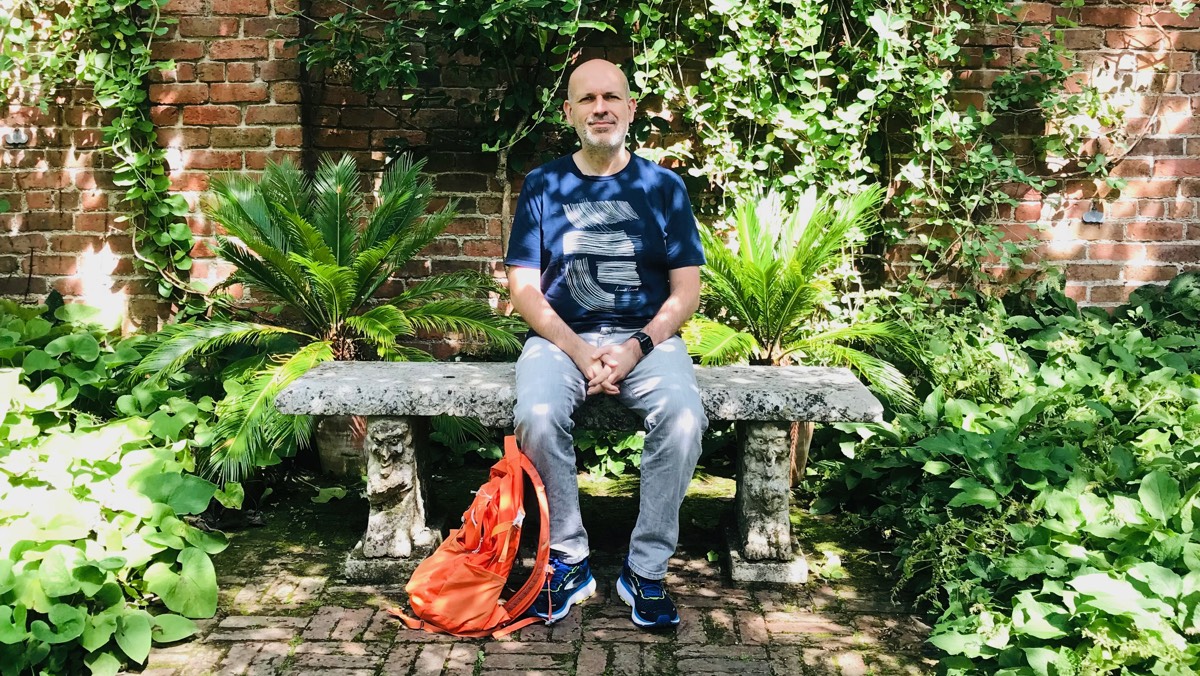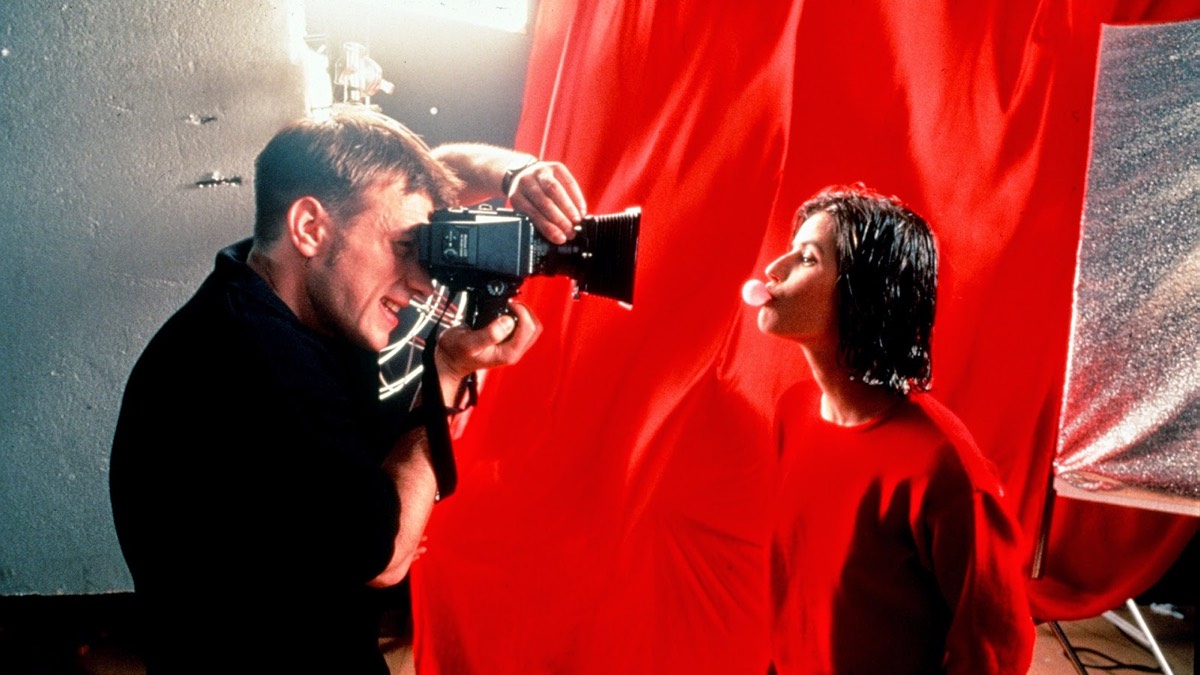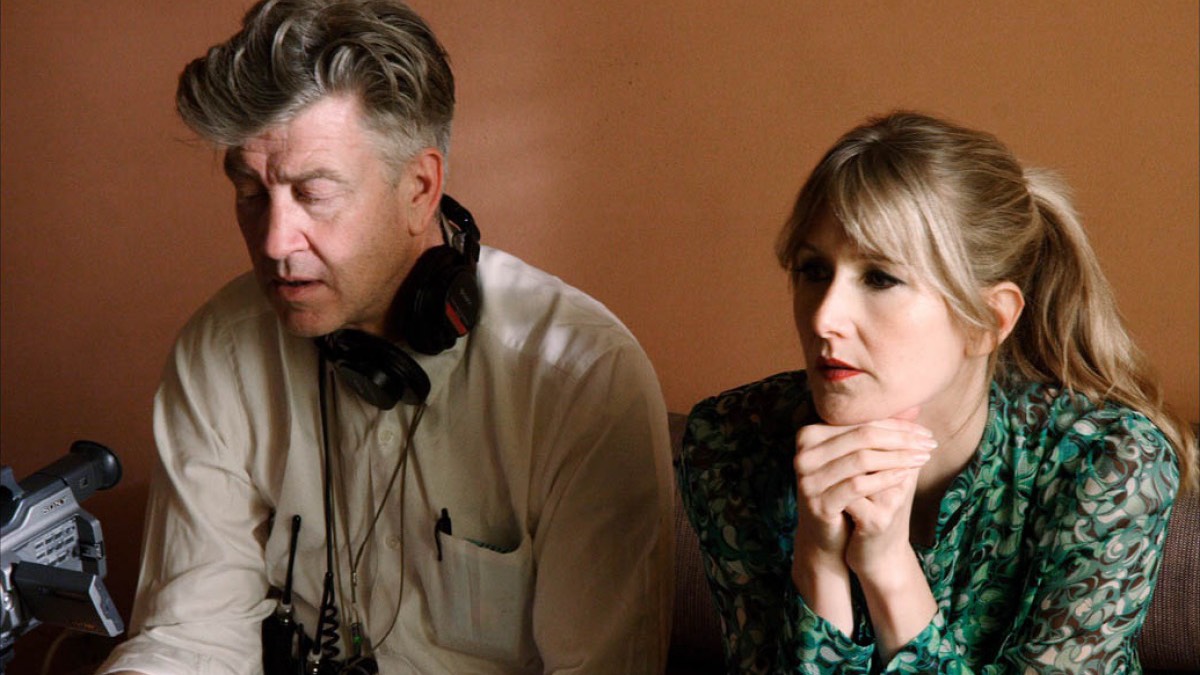Michael Walters
Notes from the peninsula
Welcome!
This is my little word garden on the internet—Michael Walters, author (it’s true!). I have a speculative fiction novel, THE COMPLEX, out with Salt Publishing, and I’m deep in the writing of a follow-up. I would love it if you gave it a try.
I use Bluesky to connect with people, Letterboxd to track films, and StoryGraph to track books. Follow me and say hello in all those places.
And if you want more of my thoughts on writing in particular, you can subscribe to my posts on PATREON. There’s a Weird and Wonderful tier if you want to support me with a donation, and that now includes notes on the novels I’m reading, but I post regularly to all patrons.

Stop rushing
Time isn’t real. The future is an abstraction. So says Alan Watts. I do rush things to get to the end of them—not always, but often enough for it to be a thing I’ve noticed over and over again throughout my life. I didn’t rush in my twenties. Rushing is something that started for me after my son was born, when the enormous pressure of being responsible for the life of another human being hit me. That was the moment I realised that whatever I wanted to do with my life had to fit around being a father first and foremost. Children require attention, a seemingly endless amount of it, and giving it to them is one of life’s great privileges, pleasures and sacrifices.
I can say truthfully that I did not rush my time with either of my children. I did a good job of being present with them and really experiencing fatherhood. The same with being a husband. I suppose it’s because I valued relationships, emotions and connection over my career, ambition, money or status. I don’t think I got the balance right, but at the same time I did the best I could with what I had. Perhaps that’s a psychological sleight of hand to make myself feel better about it. I don’t know.
I followed my father and grandfather in being a technician rather than a manager. I spent large portions of my time thinking about what to do rather than doing things. I didn’t keep up old friendships. I stayed in jobs for long periods of time rather than working my way up any ladders. None of these things were mistakes, though they sometimes feel like that, but they were choices, whether I was conscious of them or not.
All of which is to say, I am here, with this life behind me, and possibilities ahead. In this moment, writing this post, I am choosing not to rush, but instead listening to what I want to say to myself and letting the words flow through my fingers. Before starting to type, I was worrying over what film to watch, what book to read next, whether to push harder at the story I’m trying to finish for the end of the month, or if I should do yoga, crack through some chores, or worst of all worlds, start browsing through Twitter. Actually what I needed to do was sit quietly and listen. And here we are.

A seat in the sun
I’m sitting in the sun. August isn’t going to plan, but I’m doing the best I can with it. I won’t go into the details, we all have work and family dramas that flare up when we least expect them, but it means my focus on writing is suffering, and I might need to pause things to concentrate on what else needs to be done. C’est la vie.
But there is a short story I’m in the middle of writing, and it might want to be finished no matter what I think is sensible. If I commit to it, I will finish it, but at the cost of other things. I’d rather do everything I want to do. Of course, right? I don’t want to make the decision to stop writing too early—it might all come together if I keep it alive in my mind—but walking the line of what’s possible and not is both precarious and uncertain. Hell, writing is an ambiguous process at the best of times.
I’m doubtful, and it all seems like an intuitive rats nest, but I think I’ve talked myself into the juggle. To sail on and tack into the wind. Well, alright then.

Auguste
The Three Colours trilogy marked my move from July into August, and amusingly the fledgling judge in Red is called Auguste. I don’t know why I chose Three Colours: Blue—actaully, I do remember. I ordered my iTunes movies by date purchased, and it was the oldest film I still hadn’t watched. May 2014, so over seven years ago. I had the trilogy as a VHS box set in the mid-nineties, along with Miller’s Crossing, Alien, Lone Star and Die Hard, and I would lug them in carrier bags as I moved between my grotty flats. That’s a pretty accurate reflection of my taste now too. Not the grottiness but the range of genres.
Twenty-five years later, Blue blew me away, White was pristine (but hard to love, lol), and Red was the perfect finale. I watched White and Red together, today, just before I started this post, and that allowed me to see all the little character overlaps. The thing I love most about Krzysztof Kieślowski is the way he manages to show you something important and new, with feeling, when you are not expecting it, usually through imagery, but also connections between events, lines of dialogue, and ideas. He doesn’t give you it all on a plate. He leaves space. A true act of artistic generosity.

Inland Empire
Director: David Lynch
Release year: 2007
In Inland Empire, which is also a massive region of land with nebulous boundaries east of Los Angeles (just saying), married actress Nikki Grace wins a part in a film opposite known philanderer Devon Burk. On the first day on set, director Kingsley Stewart tells them he has just found out the script is actually a remake of a German film called 47, which was never finished because the two leads were murdered. Nikki’s husband Piotrek is controlling and jealous, and he threatens Devon, but Nikki and Devon start an affair anyway. Then shit gets weird.
There are multiples stories unfolding, in Los Angeles and in Poland, in Vikki’s real life, in the film they are making, and in the apparently cursed film they are remaking, which Vikki seems to move in and out of. It quickly becomes clear we can’t know for sure where we are, and there is the extra quality of the DV camera Lynch used, whose grainy, home video picture and poor sound quality constantly reminds us we are watching Lynch make a film.
It’s an unusual and meta experience to say the least, but after three hours, as the end credits roll, I find I’m crying, because of the joyful music, yes, and because I’m exhausted, definitely, and because this is probably David Lynch’s last film, and it’s the end of my David Lynch project, but the biggest reason I think is that if it’s possible for someone to make Inland Empire, this ridiculous, epic, surreal, sometimes dull, sometimes exhilarating, contradictory, confusing, experimental art film, then honestly, and this is quite an insight after a month of Lynch’s work, and probably what I was hoping to realise, anything is fucking possible.

Mulholland Drive
Director: David Lynch
Release year: 2001
The pattern David Lynch tends uses in his more archetypal work is again on display in Mulholland Drive – events organically unfold, the images are striking, the narrative is confusing, characters are not who they seem to be, and in the last twenty minutes he reveals what’s really going on, which is then open to even more interpretations. It’s a heady formula that allows him to explore the psychological themes that clearly fascinate him.
I was pretty frustrated with Mulholland Drive until the last act when, true to form, he performs his magician’s trick. It was created as a pilot for a television series with NBC, which the studio didn’t like, and Lynch then was given money by StudioCanal to finish it as a film. It feels like it was meant to be open-ended, with many elements reminiscent of Twin Peaks, but the ending he came up with does a pretty wonderful job of sealing it in movie form. Like Fire Walk With Me and Lost Highway, the story hinges on the main character’s psychological reaction to trauma, in this case an alternative reality that of course cannot last.
There is only one film left in my May project to watch all of David Lynch’s films. I feel sad the project is ending soon, and there is no more film Lynch to explore, but he’s still making television series, and he might make another movie. He’s not dead yet. I suppose I prefer the Lynch who has to constrain himself to two hours than the one who lets himself sprawl – which takes us neatly into Inland Empire.

The Straight Story
Director: David Lynch
Release year: 1999
If David Lynch were trying to somehow redress all the darkness of his earlier films in one go, then he would make The Straight Story. Like The Elephant Man, it’s straightforward and forgoes the dreams, fantasy sequences and excess of Lost Highway, Twin Peaks and Blue Velvet. It really is a pure thing. Old age is investigated with a tender eye, and the hero, Alvin Straight, is wise and practical.
When he hears his brother has had a stroke, Alvin sets out on an odyssey to travel the three hundred miles to his brother’s house on a lawnmower. His eyes are too poor to get a driver’s license, but we realise the lawnmower has become a choice when he is offered a lift but refuses it. As he says, he wants to do it his own way, which you get the impression he has done his whole life.
Everyone he meets is good-hearted, and the handful of conversations he has on the road each reveal something about his nature, or his past. His hard-won wisdom rubs off on people. He very much reminded me of my grandfather – quiet, creative with mechanical things, a problem solver, stubborn, sometimes abrasive, and carrying memories he struggles to speak of. To me The Straight Story is a lovingly told expression of appreciation and respect for this type of man, made even more poignant in knowing that that generation, who fought in World War 2, are now almost all gone.

Lost Highway
Director: David Lynch
Release year: 1997
Lost Highway is a puzzle. It opens with a jealous husband who thinks his wife is having an affair, and ends with a deadly resolution, but what happens in between is ambiguous and complicated. There are unsettling video tapes left on doorsteps, threatening hallways that seem to swallow characters up, dream sequences that might be memories, a menacing man who is in two places at once, and a character switch at the end of the first act that takes the film in a completely different direction.
After following intense jazz saxophonist Fred Madison, we move into the life of laid back mechanic Pete Dayton who falls for Alice, a doppelgänger of Fred’s wife. The film becomes a noir mystery in this second act, as Alice seduces Pete, and draws him into conflict with the violent and unpredictable Dick Laurent.
Lynch loves psychological stories, and has said that he was thinking a lot about the OJ Simpson trial at the time he was writing Lost Highway, in particular how a man could kill two people and then carry on with his life as if nothing had happened. Twin Peaks’s Laura Palmer did a similar split within herself to cope with trauma, and that is the key to Lost Highway. Characters are archetypal, more than one character is not who they appear to be, and in the end Fred’s psychological problem of jealousy is solved.
In an interview with American Cinematographer, Lynch talks about how his ideas come into being, which I think shines a light on the unique quality all of his films have:
When asked to explain how his rather unique thought processes conspire to conjure up his cinematic visions, the director assumes a sincerely thoughtful expression. “Everything sort of follows my initial ideas,” he offers. “As soon as I get an idea, I get a picture and a feeling, and I can even hear sounds. The mood and the visuals are very strong. Every single idea I have comes with these things. One moment they’re outside of my consciousness, and the next moment they come in with all of this power."
The complexity of Lost Highway might come from this process, where powerful images force themselves into Lynch’s work, and he has to work out what to do with them. It might be impossible to rationally explain it all. Sometimes the image requires a leap of faith, by the filmmaker and the audience.

Director: David Lynch
Release year: 1992
A howl of pain from Laura Palmer, the murdered girl that opened the TV series, Twin Peaks: Fire Walk With Me is difficult, heavy, hard to watch in places, and grapples with incest, rape, drug-taking, murder, domestic abuse, and the psychological consequences. Perhaps we get the opening half hour with the citizens of nearby Deer Meadow to connect us with the humour and quirkiness of the TV series, although these people have an obnoxious streak, but it does feel odd, like a different film. By the end, it feels like another universe.
The film is brutal and haunting, but I found it frustrating that Lynch felt compelled to make it at all. It tries to explain and wrap up the mysteries of the TV series, but it doesn’t quite stand on its own as a piece of art. If I hadn’t seen the first season of the TV series, and know the ending of the second, I don’t know how much of this would have made any sense.
Having said all of that, as a telling of the story of a victim of incest, it’s mature, emotionally smart and absolutely devastating. I just wish that either there were less decorative aspects of the TV series, or they were woven in more coherently. However, there are shots and scenes in this film that I will never forget. It’s a flawed masterpiece.

Wild at Heart
Director: David Lynch
Release year: 1990
After Blue Velvet, Lynch made the first season of Twin Peaks, then pivoted into Wild at Heart. It’s a series of deliberately melodramatic, hyper-violent and sexual scenes stitched together into a road movie, with a tenuously-made connection to the Wizard of Oz.
The performances are amazing, but I found the overall effect rather numbing. I didn’t really care about Sailor and Lula’s relationship – in fact, I wanted Lula to strike out on her own, Sailor being mostly a liability. Lula uses Sailor’s violence to escape the clutches of her shockingly possessive mother, who sets off a pack of creatively grim villains to kill Sailor and bring Lula back home. The most interesting part of the film is the middle section, where the sexually ravenous couple begin to open up to each other, and the bad omens mount, including a haunting scene where a woman is wandering near a car crash, not knowing she is dying, looking for her things in the sand.
Lynch said he wanted to make ‘a really modern romance in a violent world – a picture about finding love in Hell’, and I think he succeeded. For me, the ironic tone and melodrama took me too far out of the film, and I found myself sometimes bored, which I hesitate to say about a film with such an enviable reputation. I also have to remind myself that there was nothing like this at the time, and Wild at Heart’s influence can be seen in Reservoir Dogs, True Romance and Pulp Fiction.
Wild at Heart takes Lynch in a different direction. I didn’t love it, but it’s an important stepping stone. Everyone in the film seems to be having fun, and it’s a perfect palette cleanser after the double hit of slow-paced small town darkness in Blue Velvet and Twin Peaks. This is David Lynch on the road and cutting loose.

Blue Velvet
Director: David Lynch
Release year: 1986
I was nervous going in to Blue Velvet, more so than any horror film. It has a fearsome reputation but is also culturally beloved. Dennis Hopper’s over-the-top performance has become iconic, and its themes foreshadow those in the massively popular Twin Peaks. Some films become intimidating over time as more and more is written about them, but it was what I knew of Hopper’s Frank Booth and the sexual violence that put me off watching it for so long.
Blue Velvet is a brilliant film, as outrageous and disturbing as I’d heard, and about many things – innocence, curiosity, darkness, tenderness, violence, growing up. Jeffrey comes home from college because his father has had a stroke. He finds a severed ear on waste ground and takes it to the police. Detective Williams tells Jeffrey not to ask any more questions, but Jeffrey’s curiosity sends him on an odyssey into the underbelly of his seemingly picture book hometown.
Lynch knows his unconscious onions. With Jeffrey’s real father out of action, Detective Williams is a kindly replacement, just as Frank Booth is a sadistic one. The film is full of opposites like this. Jeffrey falls in love with Williams’s daughter, Sandy, but is sexually attracted to the damaged and dangerously masochistic Dorothy, who Frank is blackmailing into sexual slavery. Jeffrey has several opportunities to withdraw from the mystery, but he keeps going, thrilled by the hunt and illicit sex. He wants Sandy and Dorothy, but reality hits when Frank forces him into a hellish drive out of town, where at one point, Frank says to Jeffrey, ‘You are like me.’ Through the film, Jeffrey absorbs some of Frank’s cruelty, hitting Dorothy during sex, and eventually shooting Frank in the head. From a Jungian perspective, by the end Jeffrey has endured a great deal of suffering, but is rewarded with the integration of a large chunk of his own shadow.
Jeffrey’s whole adventure could also be read as a distraction from the grief and fear that his father might die. At one point the camera goes into the severed ear, and at the end it pulls back out of it. Was everything in between a dream?
There’s a fascinating episode on curiosity, by the This Jungian Life podcast, describing curiosity as an innate human drive that can be both useful and destructive. Jeffrey’s voyeurism and passion for the mystery makes him take enormous risks, and by the end he has used what he has learned from Frank and Dorothy to clean up the darkness in the town and create for himself a place of relative contentment. He wrestles with his own violent, sadistic and masochistic impulses, and comes to appreciate how the robins of love from Sandy’s dream also eat fat bugs. Love and darkness are intimate. As Sandy says, ‘It’s a strange world, isn’t it?’
From a writing process perspective, I love how it was conceived by Lynch years earlier as a vague feeling, and a title, to which he later added the image of an ear in a field, and the song Blue Velvet. He considered the screenplay he wrote from those seeds unpleasant and not good enough to make, but after directing Dune, he came back to it. He added a voyeur discovering a murder mystery, and the scene where Dorothy emerges beaten and naked on the street was something he actually experienced as a child.
In Blue Velvet, Lynch successfully created something culturally important and resonant that was also deeply personal. He used his curiosity about his own inner world to create a vivid and vibrant piece of art. That’s inspiring.